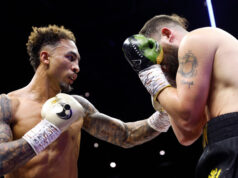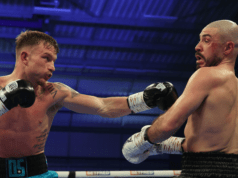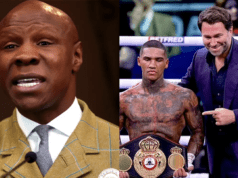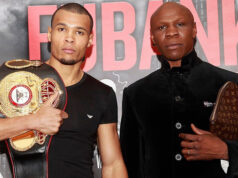Do Today’s Greats like Manny Pacquiao Get Unjustly Underrated Historically?
There is an interesting phenomenon in the history of boxing that doesn’t exist in other sports. There are contemporaries in other sports that are considered the best ever in their sport: Tiger Woods in golf, Roger Federer in tennis, Usain Bolt in sprinting, and others who are at least considered among the best in their respective sports. In boxing, modern fighters rarely receive such a lofty distinction. A look at most respected all-time lists reveals you must go pretty far down the list to find a modern boxer.
Roberto Duran is on a lot of top ten lists. Sugar Ray Leonard is usually in the bottom half of most historians’ top 25 lists, which are the highest placements of anyone who has boxed in the last 30 years. Manny Pacquiao, with 7 titles in different weight classes and a juggernaut reign of terror on his resume, has only just begun to crack some historians’ top 25 lists.
Why is boxing the only sport with such little modern representation on its all-time greats list? Is it possible that historians are holding something against today’s boxers that they cannot control—namely the modern structure of the sport? Boxers of yesteryear fought far more often and against tougher competition. One year, middleweight great Harry Greb fought more rounds than Evander Holyfield has fought in a 26-year career. It wasn’t uncommon in the old days for a top fighter to fight 5 or more HOF inductees in one year. That’s just the way the sport worked back then.
Modern fighters cannot hope to compete with the accomplishments of old-time greats while bound to a completely different structure under which the sport now operates. They certainly do not stand a chance if historians continue to judge fighters based on comparing the lists of top fighters they beat. It’s not normally a faulty way of judging greatness, as it is done in all other sports. The critical difference is that the number of games played in those sports has stayed relatively consistent over the years. In boxing, the number of opportunities to show greatness has diminished greatly. Fighters in the old days had line-by-line records that read like the final credits of Titanic.
Some of the old-time greats had 200 and 300 fights. Today, a fighter with 50 fights is considered a grizzled veteran. Is it reasonable to expect boxers to do in 50 fights what it took old-timers to do in 200? What if we judged modern baseball players against the old timers on a strictly statistical basis if modern players only played 40 games a year? What if the NFL season was shortened to five games and we judged all future running backs based on career yardage?
Surely there must be a different way of looking at greatness. In the old days, greatness was demonstrated by fighting and usually beating every single tough guy multiple times. That avenue is simply not available for the fighters of today. Another legitimate method for fighters to establish greatness is (or should be) by simply creating a certain amount of separation from their contemporaries. If a fighter shows dominance over his era that is clear, then that should count toward establishing greatness on an all-time level.
This is in no way intended to belittle the accomplishments of past greats. There is something to be said for how they conducted themselves. Boxers who fought tough guys all the time and fought more often were naturally more tempered by battle than the fighters of today. To survive the fight game in the old days was a true testament to a fighter’s durability. When you fight one great fighter after the next, you’re going to be a better fighter. With only eight divisions and one champion per weight class, it was also more difficult to establish greatness. Not to mention that there were actually more fighters active in the old days.
Encouraging historians to give modern fighters more credit is not a condemnation of the old guard. But have some of them become greater with the passage of time? It seems that some historians over-emphasize the triumphs of past greats while sweeping their failures under the rug. It’s only fair to acknowledge the losses, especially since historians are using their best wins to set them apart from modern fighters. The opposite must also apply. If the old-time greats’ list of best wins put them in a different category than a modern fighter, then their losses should be factored into the equation as well.
For example, a modern fighter who is 4-1 against HOF-caliber opposition will inevitably be ranked below an old-time fighter who was 9-7 against HOF fighters. It’s as if the old-timers’ losses do not register as clearly as they do with modern fighters, but only their wins count. So while Floyd Mayweather and Manny Pacquiao might never compile a list of victims that compares to the old-school greats, they also don’t have the long list of defeats most of those greats have. It evens out in a sense. At least it should. Maybe for every 1000 times you hear how Sugar Ray Robinson won the Middleweight Title 5 times, you should once hear how he lost it 5 times too.
Let’s face it: Old fighters become better over time.
They benefit from the lore that is cultivated over decades and decades. Modern fighters haven’t had the privilege of having their legends stew in the juices of nostalgia and sentimentality. You can be fairly certain if Manny Pacquiao had fought in the 1930’s, he’d be looked at now as a legend of almost mythical proportions.
Why are those who are responsible for writing boxing history so slow to come around to the greatness of the modern set? Perhaps it is psychological. We all suffer from this. We are inclined to think that the stars of today don’t do it as well as the old timers. Whether it is music, movies, or any highly visible walk of life, there is a human need to regard our heyday with more fondness than other eras. That’s why if you ask a man over 75-years old who the greatest heavyweight is, he’ll probably tell you it was Joe Louis, while a younger fan would say Muhammad Ali. It’s almost as if admitting the guys from our era wouldn’t stand up against today’s greats is admitting we are not as good as we used to be, that we can’t get it done anymore.
Take Henry Armstrong, for example. By any estimation, he was a great fighter and deserves the high historical placement he receives. He held 3 out of the eight titles available in the sport simultaneously, so in essence, he held almost 40% of the titles in the entire sport! Surely he deserves such a high placement, but let’s break it down a bit. In late 1937, Armstrong won the featherweight title over Petey Sarron—a good fighter. About 6 months later, he beat legendary Barney Ross for the welterweight title, then 3 months after that; he beat Lou Ambers for the lightweight crown. That’s 3 big wins right there. He did lose the return match with Ambers in 1939, and while he defended his welterweight title a bunch of times, none of his challengers were very memorable. Then at 27, he dropped two fights to Fritzie Zivic, effectively ending his dominant ways.
So while Armstrong was clearly dominant, his time at the top was relatively brief. His best wins are against Barney Ross (in Ross’ last fight) and Lou Ambers, who also beat Armstrong. He has a bunch of wins over good fighters, guys like Baby Arizmendi (who also beat Armstrong twice). I believe Armstrong was one of the true greats, but does his record indicate that he should be 20+ spots above Manny Pacquiao? Perhaps it does not.
It bears repeating—fighters of today do not even have the same opportunities to establish greatness on the levels that the old-timers did. Could a boxer of today fight for the undisputed featherweight, lightweight, and welterweight titles today in a 10-month span like Armstrong did? The politics of the sport wouldn’t even allow for it. Could a champion defend 18 times in two years like Armstrong did? Why do we continue making these comparisons when it’s impossible for modern fighters to even attempt these feats?
I think Manny Pacquiao has assembled a resume that is at least somewhat comparable to Armstrong’s in terms of quality. It’s in the same ballpark. He has been utterly dominant now for roughly the same amount of time, his list of best wins is arguably deeper than Armstrong’s, and his margin of dominance is roughly as clear as Armstrong’s. I think Armstrong may have a few huge wins on his ledger that Manny doesn’t quite have, but what if Manny beat Floyd Mayweather? It would probably still leave him a dozen spots below Armstrong. Armstrong deserves to be ahead, but not by an insurmountable margin, which is probably the case.
The method in which we historically judge fighters is inherently unfair. Boxing is the only sport where you can basically tell any young pro who is starting his career that he has no chance whatsoever at becoming the greatest ever. Manny Pacquiao could beat Mayweather and would still be left off most top ten lists! After everything he has accomplished? How can that be?
Other sports make allowances for changes in the conditions of their sport. Jesse Owens is still considered a great sprinter despite the fact that top women sprinters have eclipsed his best times. Do track and field historians continue to judge sprinters based solely on time? Of course not—they continue to rate Owens highly due to his dominance over his contemporaries. Why can’t we do the same with boxing?
If a fighter establishes his superiority in a clear manner that sets him apart from his peers, shouldn’t that be enough? Why must we rigidly adhere to a standard where we go line-by-line down a fighter’s resume, stack wins up, and compare? While a fighter’s complete list of worthwhile victims is a critical component of measuring greatness, there are other standards.
Boxing needs to do a better job of promoting the all-time greatness of fighters during their careers. The sport does such a great job of super-humanizing the efforts of past greats, that it would be well served to provide and apply a more realistic historical context toward today’s top fighters. Fans of other sports can watch with the knowledge that they are watching the best ever. Why can’t boxing fans experience the same thing?










